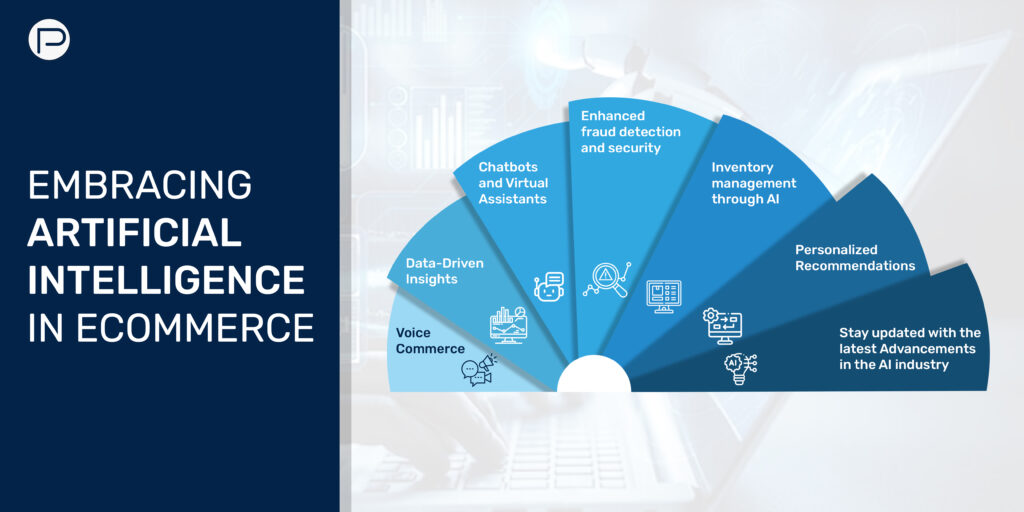Table of Contents
Introduction
If we discuss what Artificial Intelligence is, a few might start thinking about robots, while on the other hand, some might elaborate more on advanced technologies coming up in alignment with AI and big data.
Artificial intelligence has revolutionized how businesses work and will continue to do so. Focusing more on AI’s involvement in the eCommerce industry, it is more technology and algorithm-based. To get an edge in this fast-pacing industry, brands must adapt to the ongoing trends and stay ready for the forthcoming ones.
Embracing Artificial Intelligence in eCommerce
While talking about its contribution to the eCommerce industry, AI has established itself as a trailblazer at every level. From Chatbots to high-end technologies, AI offers ample opportunities to scale businesses and optimize operations. And, as AI continues to reshape the online retail industry, businesses need to stay ahead of the curve and leverage this technology to their advantage. Here are some strategies to help you stay ahead in the dynamic eCommerce landscape.
The Role of Artificial Intelligence in eCommerce
- Personalized Recommendations
You must’ve noticed recommendations popping up when you search for a particular product or even think about buying it; you get a related ad the next moment. AI plays a significant role in gaining insights into preferences, browsing behavior, and order history. Businesses can provide tailored recommendations with a personal touch to every customer through the gathered data.
Recommendation engines are significant for personalization; IndustryArc reported that the recommendation engine market is projected to be worth $12 billion by 2025. In another report by 360i Research, the software market was valued at $943 Million.
- Chatbots and Virtual Assistants

AI-powered customer support is another area where businesses can benefit from embracing AI in eCommerce. Chatbots and virtual assistants powered by AI algorithms can handle customer inquiries, provide real-time assistance, and make personalized recommendations. These automated systems provide 24/7 customer support, reducing response times and enhancing the overall customer experience. Businesses can efficiently handle large inquiries by leveraging AI-driven customer support and freeing up human resources for more complex tasks.
- Enhanced fraud detection and security
With the growth of eCommerce, the risk of fraud also increases. AI can help detect fraudulent activities by analyzing real-time patterns and anomalies. Implement AI-based fraud detection systems that can identify suspicious transactions, flag potential risks, and protect your business and customers from fraudulent activities.

Enhanced cybersecurity
Fraud detection and security are critical concerns in eCommerce, and AI can provide robust solutions. AI algorithms can continuously monitor real-time transactions, detect patterns, and identify anomalies that may indicate fraudulent activities. By leveraging AI-driven fraud detection systems, businesses can prevent unauthorized access, protect customer data, and ensure secure transactions. This instills trust in customers and safeguards the reputation of the business.
- Data-Driven Insights
AI enables users to make informed, data-driven decisions for their brands. AI algorithms process and analyze data, track ongoing trends, and keenly monitor competitors’ information. With such insights, companies can optimize their marketing strategies, personalize promotions, and identify untapped opportunities. By leveraging AI for data-driven decision-making, businesses can adapt quickly to changing market dynamics and gain a competitive edge.
With Paxcom’s in-house digital shelf analytics software, you can tailor your business needs and stay ahead of the curve. The software helps you track real-time information, monitor stock availability, and ensure visibility across marketplaces. With its personalized dashboard, you can analyze the essential metrics of your ads and compare KPIs with brand goals and category benchmarks. Compare performance with the previous day for key KPIs
Read how Kinator helped a brand amplify its stock availability by 94%.
- Voice Commerce

New opportunities have arisen in eCommerce due to the rise of voice assistants and smart speakers. By integrating voice commerce capabilities, businesses can enable customers to make purchases, inquire about products, and interact with their brands using voice commands. Voice commerce offers convenience, hands-free shopping, and a seamless experience, catering to the growing number of users adopting voice-enabled devices. Prominent examples are Amazon’s Alexa and Google Home.
By implementing voice commerce capabilities, you can leverage your brand by allowing customers to make purchases and interact with your brand using voice commands, giving you a competitive edge.
- Inventory management through AI
Inventory Management is a complex task, but AI helps streamline the process by analyzing historical sales data, and predicting market demands at multiple stages. Through demand forecasting, brands stay more aligned with forthcoming trends and opportunities. It further helps manage inventory levels with minimum stockouts, ensure customer satisfaction, and maximize profitability.
- Stay updated with the latest Advancements in the AI industry
The field of AI is rapidly evolving. Stay informed about the latest AI advancements, trends, and best practices in eCommerce. Transparency and accountability are essential for customers’ trust. Continuous learning and experimentation will help you uncover new opportunities and adapt to the evolving landscape.
While AI helps businesses streamline operations, companies must also recognize the importance of the human touch in customer interactions. Maintain a customer-centric approach and ensure that AI technologies enhance rather than replace human interactions, providing a personalized and seamless shopping experience.
In conclusion, integrating Artificial Intelligence in eCommerce presents numerous business opportunities to succeed in the digital era. AI enables businesses to stay ahead of the curve by providing personalized experiences and efficient customer support, as well as leveraging data insights and improving security. By adopting AI, eCommerce businesses can unlock new levels of efficiency, improve customer experiences, and lay the foundation for continued growth in the ever-changing online commerce landscape.
Amplify your business with Paxcom’s digital shelf analytics software. This modern-day software is designed to meet all your business needs. From keeping track of inventory to minimizing sales losses, Kinator offers advanced reporting and visualization to help brands understand performance better. It enables tracking unauthorized sellers daily to protect the brand image from duplicates.
AI is now at a stage where it can predict what sort of content and creatives would work best for a target market. Not only that, it would even generate the needful for you. This is one aspect that every business would try to take advantage of.
Paxcom always believes in staying at the forefront of advancements and can help you navigate digital performance. Connect with us at info@paxcom.net for more information.















